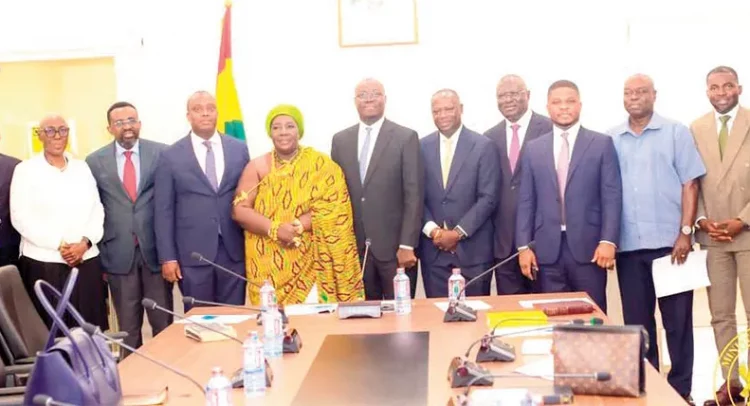Dr. Ato Forson with members of the Ghana Gold Board
The Minister of Finance, Dr. Cassiel Ato Forson, has praised the newly inaugurated Ghana Gold Board (GoldBod) for its critical role in helping the country to achieve recent stability in the Ghana Cedi.
Speaking at the inauguration of the Board in Accra yesterday, Dr. Forson credited GoldBod’s gold reserve accumulation strategy as a key contributor to the cedi’s remarkable appreciation against the US dollar so far this year.
Dr. Forson highlighted the progress made since the establishment of the GoldBod framework in January 2025, noting that its creation followed months of careful planning by a technical committee.
According to him, the work culminated in the passage of the GoldBod Bill by Parliament and its signing into law by President John Dramani Mahama.
He commended the Committee for developing a robust, time-tested legal and operational framework that has now positioned GoldBod at the heart of Ghana’s economic revitalisation agenda.
The GoldBod, which is chaired by Kojo Fynn, has 13 members, including the Minister of Lands and Natural Resources, Emmanuel Armah-Kofi Buah, and the Governor of the Bank of Ghana, Dr. Johnson Pandit Kwesi Asiama.
Other members are Thomas Nyarko Ampem, Deputy Minister of Finance, Nelson Ahedor from the Minerals Commission, Christopher Opoku Nyarko from the Ghana Chamber of Mines, Godwin Nickelson Amarh from the Association of Small-Scale Miners, and Kwaku Effah Asuahene, a gold service provider.
The rest are Shaibu Mahama, Dr. Abdul-Baasit Aziz-Bamba, Marietta Agyeiwaa Brew, and Nana Ama Amissah III.
The Finance Minister described GoldBod as a “flagship initiative” by President Mahama, designed to bring long-term stability to the economy by coordinating and optimising the nation’s gold resources.
As Africa’s top gold producer, Ghana has long earned substantial foreign exchange from gold.
However, the Finance Minister lamented that the country had historically failed to maximise benefits beyond royalties and taxes.
The GoldBod, he said, aims to change that by formalising and regulating the gold trade, especially in the small-scale mining sector, and marketing Ghana’s gold on international markets.
According to Dr. Forson, the previously “fragmented and poorly regulated gold purchasing sector” led to widespread gold smuggling and foreign exchange losses.
He said institutions such as the Bank of Ghana, the Precious Minerals Marketing Company (PMMC), and even the Minerals Income Investment Fund (MIIF), along with numerous private actors, all operated with overlapping mandates. The resulting chaos, he said, prevented the country from fully capitalising on its gold resources.
He emphasised that this era of fragmentation is over, noting that the newly created Ghana Gold Board now holds the exclusive mandate to buy and assay gold and to license actors within the small-scale mining value chain.
This centralisation, the minister said, has already begun to yield results, pointing out that as of May 13, 2025, the cedi had appreciated 16.7% against the dollar year-to-date—an extraordinary reversal from the 13.4% depreciation recorded during the same period in 2024.
Dr. Forson attributed this turnaround not only to GoldBod’s operations but also to coordinated fiscal and monetary policies.
These included stringent monetary tightening by the Bank of Ghana, disciplined public finance management, and a rise in foreign exchange inflows from gold, cocoa, and remittances. Together, these measures have helped position the cedi as the world’s best-performing currency in April 2025.
He assured Ghanaians that the cedi’s performance is sustainable, backed by record-high foreign exchange reserves at the Bank of Ghana—well ahead of targets set under the country’s International Monetary Fund (IMF)-supported programme.
Dr. Forson stressed that the emergence of GoldBod would continue to reshape the outlook for the country’s currency and economic performance by challenging traditional economic projections and strengthening foreign reserves.
He called on the board to sustain the gains made so far, and added that the success of GoldBod would be instrumental in advancing President Mahama’s economic reset agenda.
He urged the Board to continue driving forward the vision of a resilient economy, with prosperity for all Ghanaians.
By Ernest Kofi Adu


